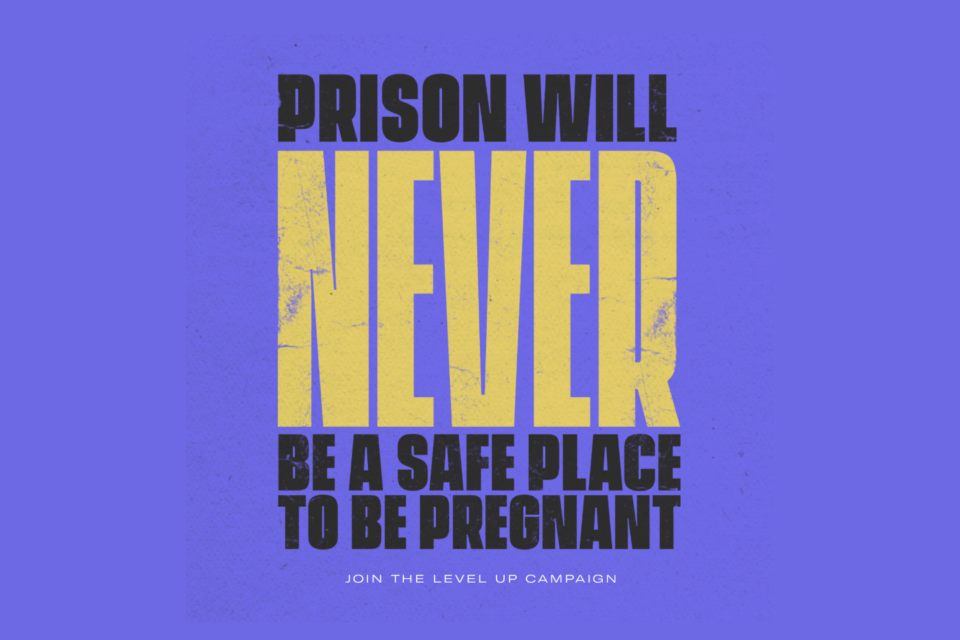In the last two years, two pregnant women inside UK prisons gave birth inside their cells. Both of their babies died. These deaths at HMP Bronzefield and HMP Styal made the news headlines, but they still haven’t stopped courts sending pregnant women to prison. It’s time for that to change.
Prison will never be a safe place for pregnant women. Pregnant women in prison are five times more likely to suffer a stillbirth, and more than twice as likely to give birth to a premature baby that needs care from a neonatal unit. Beyond the risks around birth, it’s widely accepted that pregnancy and the first 1,001 days of a baby’s development are formative. Prison causes toxic stress and trauma to both mother and child, which means that short sentences can have a long-lasting, lifelong negative impact.
This is why Level Up, in coalition with Birth Companions and Women in Prison, have launched a campaign to end prison sentencing for pregnant women.
The campaign is driven by several women who were pregnant in prison themselves, whose experiences feature in a short campaign film. One woman, Sophie*, describes her experiences:
“When I went into labour, I was escorted by two prison officers and cuffed to one of them whilst in active labour. He told me ‘I should be grateful they put me in long cuffs, not short cuffs’, and when I was begging them to call my mum and son’s father to tell them to get to the hospital, they refused.”
“I had all my rights as a mother taken away from me when I entered the prison system. I made it to the hospital to have my son, but some aren’t so lucky. Pregnant women aren’t treated with the care they need. It’s never a safe place, as urgent needs can’t be seen to quickly. I needed to go to the hospital for reduced movements when heavily pregnant and it took five hours to go through the procedure of getting me there and finding staff to escort me. Anything could have happened in that time and I was just left locked in a cell worried out of my mind. There is no way a prison can ever be a safe place, because no pregnant woman should ever be locked behind doors.”
No pregnant woman should endure this. But right now, there is no statutory duty for courts to take pregnancy into consideration when sentencing or making a decision whether to grant someone bail. So Level Up, Birth Companions and Women in Prison are campaigning for the law to be changed so that judges and magistrates must consider the health of pregnant women and their babies when making these decisions, and to avoid sending them to prison at all costs. If you want to support the campaign, you can sign the petition here.
The torment that pregnant women endure in prison is unjustifiable, especially when you consider why women end up in prison in the first place. The vast majority of women in prison (77%) are in prison for sentences of less than 12 months. Over 3 in 5 women enter prison for short sentences of less than 6 months, for things like shoplifting or theft. This is enough time to lose your home, job and have your children taken into care. All pregnant women need access to healthcare and support from their family and community to give their child the best start in life.
19% of women in prison are on remand, awaiting their trial. The decision for courts to remand pregnant women to prison before their trial, rather than grant them bail, can have devastating consequences. Ms A, the 18-year-old whose baby died in Bronzefield prison in 2019 after she gave birth alone in her cell at night, was there on remand. Only after her baby died was she granted bail.
Births in prison cells are not uncommon. In 2020, a Nuffield study found that 1 in 10 pregnant women in prison give birth in their cell or on the way to hospital. Dr Laura Abbott, Senior Lecturer in Midwifery at The University of Hertfordshire, published research into pregnant women’s experiences of prison in 2018, which featured the case of a woman called Layla*, who went into labour eight months pregnant and gave birth in her cell without midwifery support.
Reporting on Layla’s experience, Dr Abbott said: “They didn’t listen when she was saying, ‘I think I need to go to hospital, I think the baby’s coming,’ and she ended up giving birth in her cell.” The report continued: “staff were often unaware of whose role it was to care for pregnant women, this led to officers believing nursing staff were qualified to make midwifery decisions…In Layla’s case, this led to her birthing in her prison cell and inappropriate decisions being made about her care when in labour.”
Prison will never be a safe place to be pregnant, and will never be a safe place to give birth. No woman or baby needs to endure this trauma. When a woman is supported in her community, she is able to tackle the issues (like poverty, addiction and trauma) that swept her up into crime in the first place. In her community, she’s able to get support to give her child the best start in life, including access to healthcare, midwifery support and antenatal and postnatal healthcare.
If you believe that there should be alternatives to prison for pregnant women, sign the petition. The government can and must put an end to imprisoning pregnant women by changing sentencing laws, but they won’t do it unless we demand it.
*Names changed for safeguarding purposes
Written by Janey Starling, co-director of Level Up
Twitter: https://twitter.com/we_level_up
Facebook: https://www.facebook.com/levelupaction/
Instagram: https://www.instagram.com/levelup_uk/
Keep up to date with the latest Maternity and Midwifery news and updates by subscribing to the Maternity and Midwifery Forum YouTube Channel.


